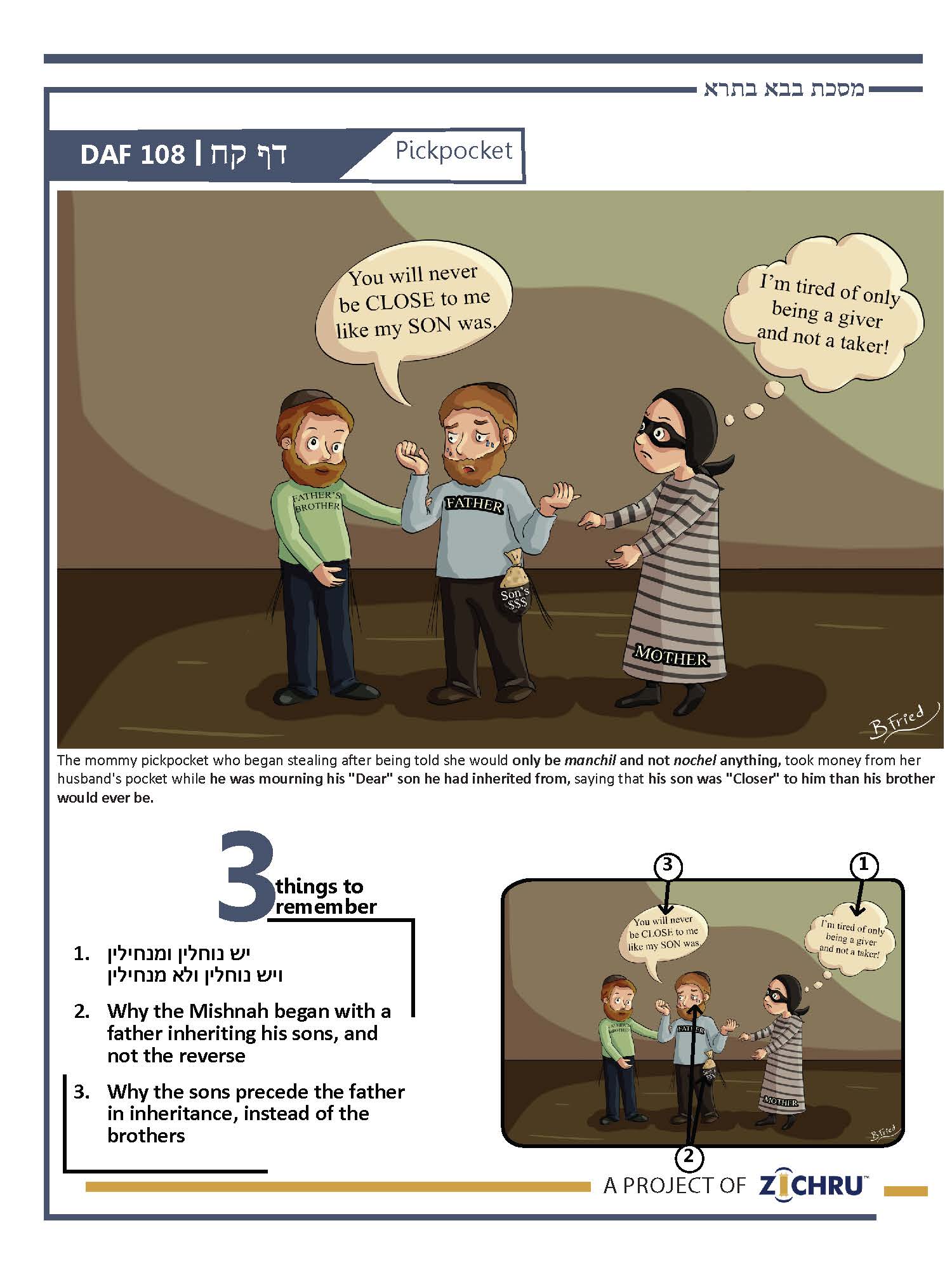Bava Basra - Daf 108
- Audio Timestamps
0:00 - The 3 Sugyos
2:53 - Review of 3 Sugyos
5:33 - Siman
7:46 - 4 Blatt Back Chazarah
14:05 - Pop Quiz (Last 7 blatt)
For access to all Zichru resources including PDFs, and illustrations CLICK HERE
1. יש נוחלין ומנחילין ויש נוחלין ולא מנחילין
The eighth Perek begins with four categories of relatives regarding inheritance: יש נוחלין ומנחילין – There are people who both inherit from, and bequeath to, certain relatives; ויש נוחלין ולא מנחילין - there are those who inherit but do not bequeath; there are those who bequeath but do not inherit, and there are those who neither inherit nor bequeath. The Mishnah gives examples of each category. (1) A father and his sons, sons and their father, and brothers of one father all inherit from each other, and bequeath to each other. (2) A man inherits his mother but does not bequeath to her; the same applies to a man and his wife, and sons of sisters (to inherit their maternal uncle). (3) A woman bequeaths to her sons but does not inherit them; the same applies to a woman and her husband, and a mother’s brothers. (4) Brothers from one common mother neither inherit nor bequeath to each other.
2. Why the Mishnah began with a father inheriting his sons, and not the reverse
The Gemara objects to the Mishnah’s first listing the case of a father inheriting his son, when it should have begun with a son inheriting his father. Firstly, אתחולי בפורענותא לא מתחלינן – we do not begin with tragedy, and this case is a man who died without children, and in his father’s lifetime. Secondly, the Torah’s passage about inheritance begins with a son inheriting his father, because it says: איש כי ימות ובן אין לו – when a man dies and has no son, etc. This implies that if there is a son, he inherits his father. For these two reasons, the Mishnah should have begun with this case!? The Gemara explains why the Tanna began with a father inheriting his son: איידי דאתיא ליה מדרשא חביבא ליה – since he derived it from a derashah, and not an explicit passuk (as taught below), it is especially dear to him, so he listed it first.
3. Why the sons precede the father in inheritance, instead of the brothers
A Baraisa derives that a father inherits his children, from the passuk which says: "שארו" – his relative, זה האב – this refers to the father, מלמד שהאב קודם לאחין – and teaches that the father precedes the brothers of the deceased in inheriting him (although this phrase is written last, the Gemara will explain that the sequence is not written in precise order of precedence). Although one might think that the father should even inherit before the son of the deceased, the passuk says: הקרוב – the closest, teaching הקרוב קרוב קודם – the closer relative precedes the more distant one. Therefore, one’s children (who are his closest relatives) precede his father in inheriting him. The Gemara asks why we assume one’s children are closer relatives than his brothers. It answers: שכן קם תחת אביו ליעדה ולשדה אחוזה - because he stands in his father’s place for יעוד (to marry his father’s אמה עבריה), and for redeeming ancestral land that the father was makdish before Yovel (so it will not transfer to Kohanim at Yovel). Although a brother stands in his deceased brother’s place for yibum, the Gemara responds: כלום יש יבום אלא במקום שאין בן – is there any yibum except where there is no son? הא במקום שיש בן אין יבום – when there is a son, there is no yibum!
Siman – Pickpocket (קח)
The mommy pickpocket who began stealing after being told she would only be manchil and not nochel anything, took money from her husband's pocket while he was mourning his dear son he had inherited from, saying that his son was closer to him than his brother would ever be.


